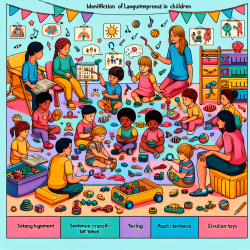Introduction
In the realm of early childhood education, preschool teachers play a pivotal role in shaping the developmental and academic outcomes of young children. The research article "Preschool Teachers’ Emotional Acting and School-Based Interactions" delves into the intricate dynamics of how preschool teachers manage and express their emotions during various school-based interactions. This blog post aims to provide practitioners with insights on how to leverage these findings to enhance their skills and foster better outcomes for children.
The Role of Emotional Acting
Emotional acting refers to the deliberate expression or suppression of emotions to achieve organizational goals. In the context of preschool education, teachers engage in emotional acting across three primary interactions: teacher-child, teacher-family, and teacher-colleague. The study highlights how teachers' decisions to engage in particular types of emotional acting are informed by the strength and intimacy of their relationships.
Key Findings and Implications
- Natural Emotions: Teachers often display natural emotions with students to build trust and comfort. This genuine emotional expression helps students feel secure and promotes a positive learning environment.
- Surface Acting: In situations where displaying natural emotions might be detrimental, teachers use surface acting to maintain professionalism and protect relationships. This strategy is particularly useful in new or challenging interactions.
- Deep Acting: Experienced teachers often engage in deep acting by reappraising situations and aligning their emotions with the needs of their students. This approach fosters empathy and understanding, leading to stronger connections with children and families.
Practical Applications for Practitioners
To harness the power of emotional acting, preschool teachers can adopt the following strategies:
- Build Strong Relationships: Focus on developing strong, trusting relationships with students, families, and colleagues. This foundation will facilitate more effective emotional acting and improve interactions.
- Reflect and Reappraise: Regularly reflect on emotional experiences and reappraise challenging situations to better align emotions with professional goals.
- Seek Support and Training: Engage in professional development opportunities that focus on emotional regulation and management to enhance emotional acting skills.
Encouraging Further Research
While this study provides valuable insights into the emotional labor of preschool teachers, further research is needed to explore how these dynamics evolve over time and across different cultural and socioeconomic contexts. Practitioners are encouraged to engage in ongoing research and discussions to deepen their understanding of emotional acting and its impact on educational outcomes.
Conclusion
Preschool teachers' ability to effectively manage and express their emotions is crucial for fostering positive interactions and outcomes in early childhood education. By understanding and implementing the findings from the research on emotional acting, practitioners can enhance their skills and create nurturing environments that support children's development.
To read the original research paper, please follow this link: Preschool Teachers’ Emotional Acting and School-Based Interactions.










